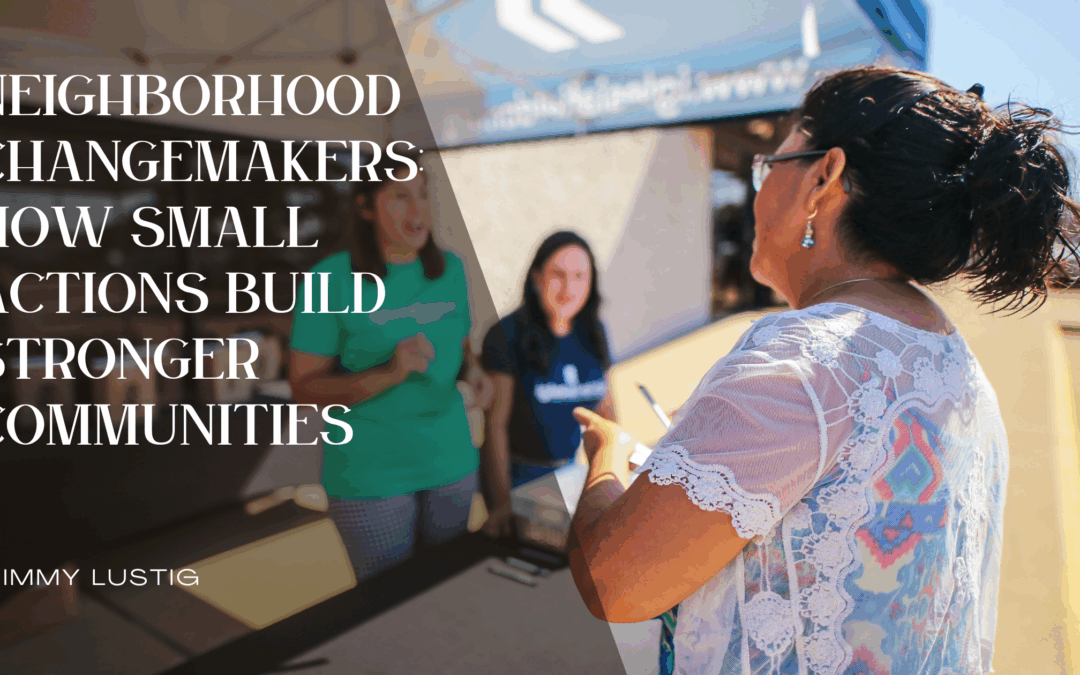In every neighborhood—whether a dense urban block or a quiet suburban street—there are people whose everyday choices strengthen the social fabric around them. They might not carry formal titles or work in public-facing roles. They may never appear in headlines. Yet these “neighborhood changemakers” have an outsized impact, proving that community transformation often starts with small, consistent actions.
At a time when large-scale social challenges can feel overwhelming, the idea that meaningful change can be rooted in daily habits is both grounding and empowering. Changemakers don’t wait for policies, grants, or major citywide initiatives. They begin with what they can control: their time, their attention, and their willingness to show up.
The Power of Micro-Commitments
If big change is the goal, micro-commitments are the engine. Helping a neighbor carry groceries, checking on an elderly resident during extreme weather, watering a struggling community garden—none of these actions solve systemic issues. But collectively, they create trust, reliability, and connection.
Micro-commitments build relational wealth, a resource more powerful than most people realize. When neighbors trust one another, they communicate more openly, collaborate more efficiently, and organize more effectively during crucial moments.
These small gestures accumulate into a culture of care—one of the strongest ingredients in long-term community resilience.
Everyday Changemakers Lead With Awareness
Neighborhood changemakers see what others overlook. They notice the isolated senior, the broken streetlight, the local business struggling to survive in a digital-first world. This heightened awareness doesn’t require expertise; it simply requires presence.
Acts of awareness often manifest in simple behaviors:
-
Picking up trash on a morning walk
-
Sharing local job openings
-
Starting a book exchange or tool-lending box
-
Offering to walk a new neighbor through city resources
Changemakers understand that community issues don’t always need large interventions—sometimes they need attention, initiative, and a bit of heart.
Small Actions That Inspire Collective Momentum
One of the most surprising aspects of small actions is their contagious nature. A quiet effort by one neighbor often becomes a ripple that inspires others. A single resident planting flowers on a neglected corner can lead to a block-wide beautification day. One family organizing a monthly potluck can bring an entire community together.
People are far more likely to contribute when they see someone else taking the first step. This is why grassroots change often spreads faster than top-down initiatives. The neighborhood changemaker doesn’t just improve their surroundings—they create visible proof that improvement is possible.
Why Local Efforts Matter More Than Ever
Today’s world feels increasingly distanced—remote work, global connections, and online interactions dominate our routines. Yet this shift has also revealed how essential local communities truly are. While global networks offer opportunity, local networks offer belonging and safety.
In times of natural disasters, economic uncertainty, or rapid social change, neighborhoods with strong interpersonal ties recover faster. They have built-in communication channels, emotional support systems, and shared responsibility.
Neighborhood changemakers are the backbone of this resilience. Their small acts of stewardship protect the spirit of local living in a fast-changing world.
The Skills Behind Everyday Community Leadership
What makes someone a neighborhood changemaker isn’t charisma or authority—it’s a mindset. Many display a set of soft skills that are increasingly valuable:
-
Empathy: Understanding what someone needs even when they can’t articulate it.
-
Consistency: Showing up regularly, not just in moments of crisis.
-
Resourcefulness: Making the most of what’s available instead of waiting for perfect conditions.
-
Collaboration: Bringing people together without forcing leadership.
-
Optimism: Believing that every small act counts, even when progress is slow.
These skills are accessible to anyone, regardless of background or resources.
Turning Small Actions Into Sustainable Change
Small actions become sustainable when they’re built into routines. This is why many changemakers don’t see themselves as “leaders”—they simply see community work as part of everyday life.
Some ways small actions grow into long-term impact:
-
A weekly litter cleanup becomes a volunteer group
-
A neighborhood watch check-in becomes a safety coalition
-
A shared garden becomes a learning space for kids
-
A local fundraiser becomes an annual tradition
Sustainability doesn’t require scaling; it requires consistency and shared ownership.
Anyone Can Become a Neighborhood Changemaker
The most powerful truth about community transformation is its accessibility. You don’t need wealth, influence, or institutional support. You only need a willingness to make someone else’s day slightly brighter or easier.
Start with something small:
-
Smile at neighbors
-
Support local shops
-
Offer help without being asked
-
Attend town meetings
-
Welcome newcomers
-
Share resources, skills, or knowledge
Every neighborhood—yours included—is waiting for the kind of energy that only everyday changemakers bring.

